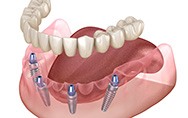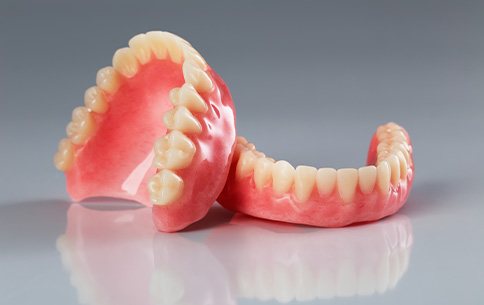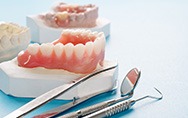Dentures – Conway, SC
Enjoy Having a Beautiful New Smile
It isn’t always easy to go through life when you’re missing a few teeth. While a complete smile is an incredible asset for both the social scene and the business world, your teeth also play key roles in how you eat and speak. Missing a few of them can also put your remaining teeth at greater risk of injury. Thankfully, our team can provide you with a set of dentures that is both convincingly lifelike and incredibly comfortable. Contact us today to learn more about how dentures can improve your quality of life!
Why Choose American Dental Care for Dentures?
- Skilled and Compassionate Dentist
- Clean and Welcoming Dental Office
- Enjoy a Full Smile of Lifelike Teeth
Who is a Good Candidate for Dentures?

Dr. Murph can use dentures to treat patients who are missing several teeth or an entire arch. The process begins with a consultation, during which our team will thoroughly inspect your mouth to evaluate your needs. If you have any issues like tooth decay or gum disease, we will work with you to resolve them so you can be a suitable candidate for dentures.
Effects of Tooth Loss

There are a number of consequences for not replacing missing teeth in Conway. With time, you’ll likely notice the following changes to your smile if you don’t invest in restorative dentistry:
- Shifting Surrounding Teeth: Each of your teeth work together to hold each other in place. This is why, when one goes missing, the others will gradually shift to fill the space between them. This can lead to bite problems, dental misalignment, and other orthodontic concerns.
- An Increased Risk of Gum Disease: Having gaps between teeth can make it harder to effectively brush and floss, increasing your risk of dental health concerns like gum disease.
- Jawbone Deterioration: Because the roots of your teeth are no longer stimulating the jawbone, providing it with necessary blood flow and support, it will begin to deteriorate.
- Difficulty Eating & Speaking: Whether all or many of your teeth in an arch are missing, you’ll likely experience difficulty eating and speaking.
- Changes in Facial Shape: Due to jawbone deterioration, your facial shape may also begin to look hollower.
What Qualifies You for Dentures?

The great news is that you won’t need to meet many qualifications in order to get dentures, making them an excellent solution to tooth loss for most patients. Their cost-effective nature and lifelike appearance also makes them a popular option!
At your consultation with Dr. Murph, he will conduct a thorough examination of your mouth and let you know whether he believes dentures are right for you. During this examination, he typically looks for good gum health and enough jawbone to support the prosthetic. Because we offer multiple different types of dentures, including partials, full dentures, and implant dentures, we’ll walk you through each of your options so you can make the best decision that meets your needs.
Alternative Treatments for Missing Teeth

If you believe dentures are right for you, like if you’re missing most or all of your teeth in a row, but you’re looking for a tooth loss treatment that is more permanent and lifelike, dental implants in Conway may be an even better option. This takes the aesthetic beauty of dentures and combines it with the unmatched support of dental implants, which are screw-shaped titanium posts that are used to replace the root structure of your missing teeth. As a result, patients are able to eliminate any concerns about slipping or shifting prosthetics.
Implant dentures may require preparatory treatments, like bone grafting or a sinus lift, but many patients agree that the effort is well worth the life-changing results!
Types of Dentures

Dentures come in several lifelike and comfortable varieties so they can meet the specific needs of different people. They consist of acrylic bases and ceramic or porcelain artificial teeth that are indistinguishable from the natural tissues and structures of your mouth. Different types of dentures include:
Partial Dentures

If you’re missing a few teeth, a partial denture can fill in the empty spaces in your smile so you can enjoy a complete grin and chew comfortably. Partial dentures are designed to clip onto your remaining natural teeth, allowing them to stay in place when you are speaking or eating. They’re also conveniently removable for easy cleaning.
Full Dentures

For patients who are missing a full arch of teeth, our team can provide full dentures so they can enjoy a complete smile again. A well-fitting set of full dentures can hold its place in your mouth using natural suction, denture adhesive, or a combination of both. They’re also easy to remove, making cleaning them a breeze.
Implant Dentures

If you want to enjoy a complete smile that can easily chew anything you like, implant dentures may be for you. These dentures hold themselves in place using four dental implants surgically placed in your jaw, providing the sturdiest foundation available for your restored smile. This creates the most lifelike restoration dentures can give a patient.
How Dentures are Made

Many patients don’t realize that the process of being fitted with dentures can potentially take weeks from start to finish. Creating a quality restoration can take time because every part is customized just for you. Our team at American Dental Care believes that understanding more about the process can help you appreciate your new teeth that much more.
Continue reading to learn more about how these prosthetics are made, and feel free to reach out with any additional questions!
What are Dentures Made Of?

Whether you get a full set, partials, or implant dentures, they typically include two main sections: the base and the pontics (the artificial teeth). We’ve described each in more detail below for your convenience:
- Denture Base- This structure is the foundation that provides support for the pontics. It can be made of different materials like metal, composite resin, porcelain, or nylon, or acrylic. The latter is a popular option because it can easily be color-matched and carved to look like your natural gum tissue. Partial dentures also often include metal clips in the base that anchor to healthy teeth in your mouth.
- Artificial Teeth- These are usually made from composite resin or resilient porcelain because both reflect light like enamel and can be customized to match your natural hue. Porcelain tends to be the default choice for complete dentures, but it can abrade healthy teeth, so it’s not always recommended for partial sets.
The Denture Creation Process

Although it might vary slightly, typically, the step-by-step process of creating your prosthetics includes:
- Step 1: Murph will take impressions of your upper and lower teeth and gums by having you bite into trays filled with thick paste. As it hardens, it creates a plaster model replica of your mouth. This will ensure your restoration is just the right size and shape.
- Step 2: This model is sent to a special dental laboratory, where a technician begins creating a wax version of your gum line.
- Step 3: Artificial teeth are placed with a mechanical device called an articulator. Then, a tech shapes and carves the wax to look like your gums.
- Step 4: The wax version is returned to us so we can schedule you for a fitting. We’ll make any necessary adjustments and then, once everything checks out, send it back to the lab to be finalized.
- Step 5: A tech places the rudimentary dentures into a flask that’s put into hot water to melt the wax away.
- Step 6: Holes are created in the pontics so that the base material will attach to them, and a liquid separator is added to the plaster layers to ensure it doesn’t stick. Then, acrylic is injected into the flask to replace the wax.
- Step 7: Using special tools, a lab tech carefully removes the plaster to reveal your final dentures, which are then placed in an ultrasonic bath to ensure they’re thoroughly cleaned.
- Step 8: Excess acrylic is trimmed away, and your artificial teeth are polished to a sparkle.
- Step 9: Once we receive your finished dentures, we’ll have one last fitting to ensure they work as intended. Finally, we’ll send you on your way with a newly restored smile!
Adjusting to Your New Dentures

It’s normal to experience mild discomfort when you first start wearing your artificial teeth. It can take about a month for your gum tissue, tongue, and other supporting muscles to accommodate them. This can lead to challenges in eating and speaking in the first few weeks, but with some patience and practice, most people can overcome any adverse effects. It might also help to use a denture cream because it forms a layer of cushion between your gum tissue and restoration for a well-deserved reprieve from any aches or sores.
The Benefits of Dentures

It’s easy to take your teeth for granted while you still have them, but once they’re mostly or entirely gone, it’ll become all too obvious just how essential they are for your everyday life. Once you replace all of your missing teeth with dentures, you’ll be able to take full advantage of the benefits they offer on a daily basis. Here’s a quick look at what you can look forward to when you get dentures to re-complete your grin.
Psychological Benefits

One often overlooked advantage of dentures is how they can improve your self-esteem. Tooth loss can cause you to feel embarrassed about the way your smile looks, and this can lead to anxiety in social situations. Some people with missing teeth even experience symptoms of depression. But with dentures, you can renew your ability to eat, speak, and smile confidently, which means you’ll have fewer reservations about engaging with others socially, and you’ll have an improved sense of self-esteem.
Clearer Enunciation

Not being able to make yourself understood is one of the more frustrating aspects of losing all of your teeth. Fortunately, wearing dentures can significantly improve your ability to communicate with others. The dentures will replace the teeth that play a critical role in speech, allowing you to once again make the sounds that are necessary for enunciating as clearly as possible, thus letting you speak confidently at important events as well as during casual conversations with friends.
Improves Nutrition

Without a full set of teeth, you won’t be able to enjoy all of your favorite foods, and your decreased chewing ability could lead to indigestion or even malnutrition. With dentures, you’ll be able to eat more kinds of foods without issue. A more varied diet is not only good news for your taste buds; it also makes it significantly easier to get all of the vital nutrients that you need for a healthy body.
Preserves Oral Health

When multiple teeth are missing, any remaining teeth will start to drift out of place, which can lead to additional oral health problems if you’re not careful. However, if you fill the empty space with partial dentures, you can help ensure that your remaining teeth will stay where they’re supposed to be. Also, your dentures will help reduce wear and tear on the teeth you still have by redistributing the pressures involved with chewing.
Expands Opportunities

One of the key ingredients of making a good first impression is a great smile that you can show off with full confidence. By replacing your missing teeth with dentures, you can make it significantly easier to make the kind of impression you want at job interviews and other important life events. In short, dentures could be the key to opening the door to all kinds of opportunities when it comes to your career as well as your personal life.
Understanding the Cost of Dentures

Your financial situation should never stand in the way of treating your lost teeth. There's no flat fee for dentures because every mouth is as unique as fingerprints. Therefore, there's no one-size-fits-all solution. Many things can affect the amount you'll pay, but we have the financial option you need to replace your missing teeth with high-quality dentures.
Factors That Affect the Cost of Dentures

Your dentist will examine your mouth and may perform other diagnostic services to ensure you're a candidate for dentures and to create your personalized treatment plan. The amount you'll pay will be influenced by:
- Preparatory Treatments: It's not uncommon to need a little prep work before getting dentures, like tooth extractions or gum disease therapy. Additional treatments will be factored into the cost.
- Materials: You'll get what you pay for when choosing materials for your dentures. Discounted materials may cost less, but you may pay more in terms of aesthetics, comfort, and quality. We will help you choose the best materials to ensure your dentures fit snuggly, last for many years, and look realistic.
- Type of Denture: Depending on the number of teeth you're missing and your preferences, you have many types of dentures to choose from, including traditional full dentures or an implant-supported solution.
Are Implant Dentures More Expensive?

You may pay more initially for implant dentures, but they are the most cost-effective overall because they should never need to be replaced. Traditional dentures last for 5-7 years. Dental implants have over a 95% success rate and a lifespan of 30 years or more. Not to mention, they are the only treatment to stop bone loss in your jaw to maintain your facial shape and improve your oral health. You can't put a price on the benefits you'll gain by choosing implant dentures.
Does Dental Insurance Cover Dentures?

Your dental insurance may cover some of the expenses for your consultation and diagnostic services. After meeting your annual deductible, your benefits may include some of the costs for medically necessary treatments, including preparatory procedures. We will work on your behalf with your dental insurance to maximize your coverage to lower the amount you will pay out-of-pocket.
Other Options for Making Dentures Affordable

A member of our dental team will review your estimate and explain the fees, so you will know exactly what you'll have to pay before committing to anything. They will also discuss your payment options, which include:
- Traditional Payments: Our office accepts cash, personal checks, and most credit cards for your convenience.
- CareCredit: Based on your credit approval, you can make monthly installments for any out-of-pocket expenses. You can benefit from little or no interest in financing to pay for dentures using low monthly payments.
Dentures Aftercare

Once you’ve received your dentures, you’ll also want to adopt a diligent hygiene regimen to make sure that your mouth remains a healthy and suitable environment for them. You’ll also need to continue attending your biannual preventive checkups so that we can keep an eye on things; however, if you do all of this, your new teeth will serve you well for many years to come. Here’s everything you need to know concerning dentures aftercare; if you have any questions, don’t hesitate to contact us for assistance!
Removable Dentures

Remove After Eating
After each meal, you will need to remove your dentures to rinse them off. This prevents food debris and bacteria from building up, and even though your dentures cannot get cavities, the rest of your teeth can. Also, keep in mind that you should never rinse your dentures with hot water, as this can warp the dentures and cause them to become disfigured.
Clean Your Restoration
Perhaps the most important aspect of dentures aftercare involves keeping them as clean as possible. However, you can’t clean your dentures properly if you don’t remove them. Once you’ve done this, you can use a soft-bristled toothbrush and a small amount of unscented hand soap, dish soap, or denture cleanser to gently brush them. Don’t use regular toothpaste or any type of abrasive products. If you aren’t going to be wearing your dentures right away, place them in water to keep them moist.
Keep Your Dentures Safe
Whenever you’re handling your dentures, be sure that you’re doing so carefully and keeping them away from young children or pets that might accidentally harm them. When you’re cleaning your dentures, we recommend placing a towel underneath the area where you’re working, to cushion any accidental falls. Likewise, put your dentures in water at night, rather than merely setting them on your nightstand. If anything does happen to your dentures, don’t hesitate to contact our office – do not try to repair them yourself, since this can cause more damage to them.
Remove Dentures When You Sleep
Did you know that taking your dentures out at night is also the perfect opportunity to soak them in a cleansing solution? This is an important step towards keeping them clean and intact. It’s also worth mentioning that wearing your dentures for too long can restrict the circulation in your gums, leading to soft tissue irritation as well as an increased risk for conditions like gum and tongue plaque.
Notice Changes
You should aim to inspect your dentures for signs of wear every single day – as soon as you notice any damage, call us at once and let us know so we can quickly address the issue! If your dentures are shifting, clicking, or showing other signs of not fitting properly, you might need to have them relined or fully replaced. The longer you put this off, the more likely the damage is to worsen, plus, your restoration won’t be functioning at full capacity. Remember, you should never attempt to fix your dentures yourself.

